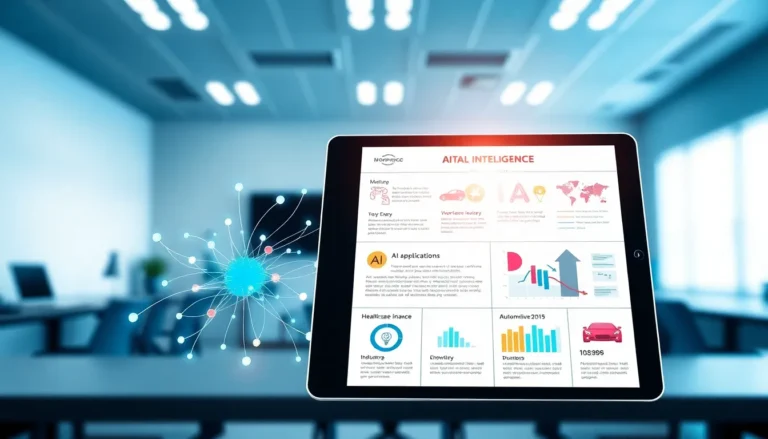Table of Contents
ToggleArtificial intelligence is the stuff of science fiction, but it’s here and it’s not going anywhere. Think of it as your friendly neighborhood robot, ready to help, if only it had a better name. If you’ve found yourself asking if there’s a better way to say “artificial intelligence,” you’re not alone. This article dives into the synonyms and related terms that pop up in conversations about AI, sprinkled with a bit of humor and a lot of insights. Grab your thinking cap, we’re about to explore the nuances of AI terminology.
Understanding Artificial Intelligence

Artificial intelligence (AI) refers to the capability of machines to mimic human intelligence processes. This includes learning, reasoning, problem-solving, perception, and language understanding. There are various forms of AI, ranging from simple algorithms to complex neural networks that power self-driving cars.
AI fundamentally changes how we interact with technology, automating tasks that once required the unique touch of a person. From virtual assistants to advanced data analytics, understanding this technology opens up a world of possibilities. As AI continues to evolve, so does its vocabulary.
When discussing AI, it’s essential to clarify terms. Imagine trying to order coffee with a barista who only speaks in jargon. You might end up with a latte instead of the black coffee you wanted. In the tech world, clarity is key. The language we use shapes our understanding, and that brings us to the synonyms for artificial intelligence.
Common Synonyms for Artificial Intelligence
In the realm of artificial intelligence, several synonyms pop up frequently. Each carries a slightly different meaning but generally refers to the same overarching concept.
- Machine Learning: This is a subset of AI that focuses on algorithms allowing computers to learn from data. Imagine teaching a dog new tricks: machine learning is the treat that makes it happen.
- Deep Learning: Venturing deeper into machine learning, this term describes neural networks with multiple layers. Think of it as a complex recipe for a multi-layer cake, each layer adds richness to the end product.
- Cognitive Computing: This phrase often leaps into discussions around AI. Cognitive computing aims to mimic human thought processes in a computerized model. It’s like giving a robot a brain upgrade.
- Intelligent Systems: Broadly speaking, these are systems capable of adaptive behaviors and intelligent actions. They are systems that can assess their environments and adjust accordingly. How cool is that?
- Smart Technology: This term is more general but frequently associated with AI. Smart technologies include anything from your smart thermostat to automated customer service bots. They’re like your high-tech friends who always know what you need.
Using these terms might depend on context, but they all fit snugly under the AI umbrella.
Exploring Related Terms
While synonyms are useful, related terms enrich the conversation surrounding artificial intelligence.
- Automation: This is the process of making tasks run independently, often through AI. Think about setting your coffee maker to grind your beans at the crack of dawn, pure magic.
- Robotics: A fascinating field that intersects heavily with AI, robotics involves creating machines that can perform tasks. From assembly lines to vacuuming your home, robots are swiftly ferrying us into the future.
- Natural Language Processing (NLP): Important for user interaction, NLP helps machines interpret and respond to human language. It’s like teaching a robot to hold a conversation, even if it might not replace your best friend.
- Data Analytics: This involves processing and analyzing data to extract meaningful insights, often powered by AI. Think of it as getting insights from a crystal ball, except this one is based on hard data.
Understanding these terms not only enriches one’s knowledge but also makes AI discussions more engaging.
Applications of Artificial Intelligence Synonyms
The synonyms and related terms for artificial intelligence reflect its applications across various fields.
- Healthcare: Machine learning algorithms diagnose illnesses faster than traditional methods. Imagine a robo-doctor diagnosing a cold based solely on your sniffles.
- Finance: Intelligent systems analyze market trends to inform investments. Your portfolio could thank you later.
- Customer Service: Smart technology, like chatbots, offers 24/7 service to customers. No more waiting on hold, now you can get help in your pajamas.
- Marketing: Data analytics tools help businesses target audiences with precision. It’s like customizing an outfit just for you, perfectly tailored messages at your doorstep.
Each of these applications showcases how deeply the concept of artificial intelligence, and its synonyms, integrate into everyday life. As AI continues to grow, so will its myriad uses.
Implications of Using Synonyms in AI Discussions
Using different synonyms to describe artificial intelligence brings both clarity and confusion.
For one, varying the terminology can enhance understanding and engagement. For example, someone might better relate to “smart technology” than to the more technical “cognitive computing.” But, it could also lead to misconceptions about the scope and capabilities of AI.
Imagine a board meeting where everyone’s throwing around terms like ‘machine learning’ and ‘automation’ without clear distinctions. This could lead to potential misunderstandings about which technology fits which challenge.
So being aware of context matters. Professionals should strive for uniform terminology to foster productive discussions. Consistency can help bridge gaps between experts and the general public, paving the way for greater adoption and understanding of AI technologies.







